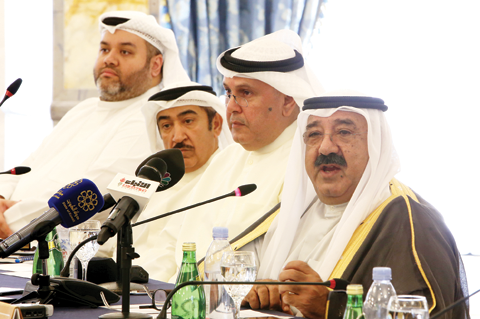'Kuwait faces a great challenge in implementing the project'
 KUWAIT: First Deputy Prime Minister and Minister of Defense Sheikh Nasser Sabah Al-Ahmad Al-Sabah (right) speaks during the workshop as Kuwait Times Editor-in-Chief Abd Al-Rahman Al-Alyan (left) looks on. —Photo by Yasser Al-Zayyat
KUWAIT: First Deputy Prime Minister and Minister of Defense Sheikh Nasser Sabah Al-Ahmad Al-Sabah (right) speaks during the workshop as Kuwait Times Editor-in-Chief Abd Al-Rahman Al-Alyan (left) looks on. —Photo by Yasser Al-ZayyatKUWAIT: First Deputy Prime Minister and Minister of Defense Sheikh Nasser Sabah Al-Ahmad Al-Sabah expressed yesterday sincere eagerness to interact socially and politically with the northern Kuwait and Silk City development projects. Works on these two projects are currently in early stages, Sheikh Nasser said in his opening speech at a workshop, entitled 'Kuwait's Northern Gulf Gateway Project: Silk City', organized by the World Bank's Kuwait Office. Silk City was not just a mere vision, but it has been a reality in Kuwait since the pre-oil discovery period, he said.
Kuwait thrives on its courteous and friendly culture, which welcomes and helps everyone without discrimination of their religion or ethnic backgrounds, he added. "This is exactly what we need to do; rehabilitate the location of Silk City and put it back on its previous historic place," said Sheikh Nasser Al-Sabah. Kuwait faces a great challenge in implementing the project, he said, affirming the country's ability to overcome such a major test just as it had always done with past major development plans.
Materializing His Highness the Amir Sheikh Sabah Al-Ahmad Al-Jaber Al-Sabah's "Kuwait 2035" vision began two years and three months ago, he said, affirming Kuwait's constant strive to provide assistance to neighboring countries. Due to geographic locations, many Central Asian nations have limited links and access to trade and interact with other countries around the world, Sheikh Nasser noted. Thus, Kuwait intends to link Central Asia, South Russia, Mongolia, and rest of Asian countries with the world through Silk City, which would also serve other countries in the region as well, particularly Iran, Iraq, and Gulf states, he noted. Kuwait is well-renowned for aiding many countries around the world as it is part of its genuine heritage, which is a blend of history, culture, commerce, and tourism, said Sheikh Nasser.
Gulf nations have a tendency of linking themselves with the rest of the world via several routes, including the Red Sea and Mediterranean Sea, he noted. GCC states benefit highly from the Red Sea mountain areas in Saudi Arabia and the coastal city of Aqaba in Jordan, he said, pointing out the valuable minerals available in these areas that could be availed.
Sheikh Nasser urged neighboring countries to understand Kuwait's 2035 vision and cooperate with each other in peace and harmony to achieve the desired goal successfully. He also hoped the workshop benefits from the World Bank expertise, especially in reviewing the successes achieved by South American and Southeast Asian nations. He also called on the workshop's participants to review World Bank's positive and negative experiences to avoid mistakes and failure. - KUNA









